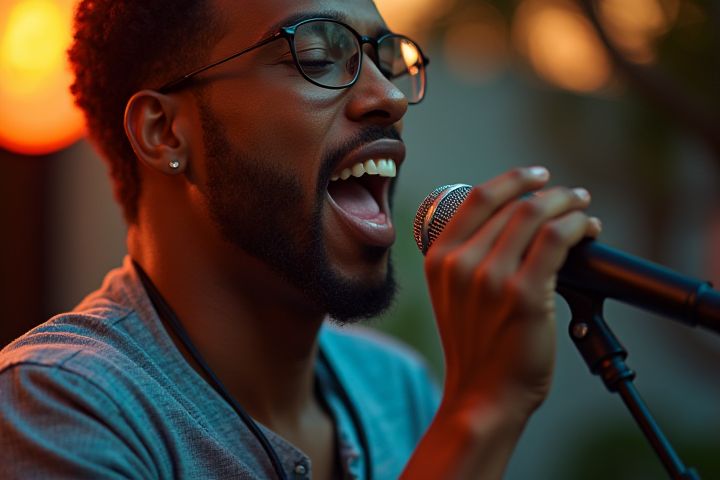
Nigerian music showcases a vibrant tapestry of styles, with genres like Afrobeats, Highlife, and Juju leading the scene. Notable artists such as Burna Boy and Wizkid have propelled the global popularity of Nigerian music, blending traditional rhythms with contemporary influences. The use of traditional instruments, like the talking drum and shekere, adds a distinct sound to many performances. Festivals across the country, such as Felabration, celebrate the rich musical heritage and foster community engagement. Your exploration of Nigerian music can reveal the cultural significance and evolution of its diverse expressions.
Afrobeat influence
Afrobeat, a genre created by the legendary Fela Kuti, integrates traditional African rhythms with jazz, funk, and highlife, shaping Nigeria's vibrant music scene. This influential style has evolved, leading to a new generation of artists who fuse contemporary elements, creating a unique sound that resonates globally. Notable Afrobeat musicians like Burna Boy and Wizkid have garnered international acclaim, showcasing Nigeria's rich musical heritage. As you explore this genre, you'll discover the deep cultural narratives and social themes often woven into the lyrics, highlighting the essence of Nigerian life.
Highlife roots
Music in Nigeria prominently features Highlife, a genre that originated in the early 20th century, blending traditional African rhythms with Western musical elements. Characterized by its upbeat tempo and melodic instrumentation, Highlife incorporates instruments like the guitar, saxophone, and trumpet, creating a vibrant soundscape. You can often hear Highlife at social events and celebrations, reflecting the rich cultural heritage of various Nigerian ethnic groups. Prominent artists such as Oliver de Coque and E.T. Mensah have significantly shaped the evolution of this genre, making it a vital part of Nigeria's musical identity.
Fela Kuti's legacy
Fela Kuti, the pioneer of Afrobeat, significantly shaped Nigeria's music scene by blending traditional African rhythms with jazz and funk elements. His transformative sound not only influenced artists across multiple genres but also served as a vehicle for political activism and social commentary. In contemporary Nigeria, musicians continue to honor Fela's legacy through the incorporation of Afrobeat rhythms and themes of resistance in their works. You can experience Fela's enduring impact at various festivals and concerts celebrating his contributions to music and culture.
Contemporary afro-pop
Contemporary Afro-pop in Nigeria merges traditional African rhythms with modern musical influences, creating a vibrant and dynamic sound. Artists like Burna Boy and Wizkid have gained international acclaim, showcasing the genre's global appeal and commercial success. This genre often features instruments such as the talking drum, combined with electronic beats and catchy melodies, making it a staple in Nigerian culture. As you explore this genre, you'll discover a rich tapestry of storytelling and cultural expression that resonates with audiences worldwide.
Rich percussion traditions
Nigerian music is deeply rooted in rich percussion traditions, showcasing a diverse array of instruments such as the djembe, talking drum, and bata. These instruments play a crucial role in various cultural ceremonies, celebrations, and storytelling, creating vibrant rhythmic patterns that engage listeners. Genres like Afrobeats and Highlife blend traditional percussion with modern elements, reflecting the country's dynamic musical evolution. By exploring these unique sounds, you can gain a deeper appreciation of Nigeria's cultural heritage and its influential role in the global music scene.
Yoruba and Igbo music styles
Yoruba music is characterized by the use of traditional instruments such as the talking drum and shekere, often featuring complex rhythms and call-and-response vocals that reflect cultural storytelling. In contrast, Igbo music highlights vibrant celebrations through the use of instruments like the ogene and udu, emphasizing a strong connection to community and spirituality. Both styles incorporate contemporary influences, merging traditional elements with genres like Afrobeats and highlife, thereby enriching Nigeria's diverse musical landscape. You can explore this cultural richness through various festivals, concerts, and local performances that showcase the talent and heritage of Nigerian artists.
Multilingual lyrics
Nigerian music is renowned for its vibrant multilingual lyrics, reflecting the country's diverse cultural landscape. Genres such as Afrobeat, Highlife, and Nollywood soundtracks often incorporate English, Pidgin, and various indigenous languages like Yoruba, Hausa, and Igbo. This linguistic variety enriches the storytelling aspect of the songs, allowing artists to connect with a broader audience while celebrating their rich heritage. You can explore the works of iconic musicians like Fela Kuti and Burna Boy, who utilize these multilingual elements to resonate with both local and international listeners.
Global music collaborations
Nigeria's music scene is increasingly characterized by global collaborations, showcasing artists who blend traditional African sounds with international genres. Notable figures like Burna Boy and Wizkid have collaborated with global stars, amplifying Nigeria's influence in the music industry. These partnerships not only celebrate cultural diversity but also extend the reach of Nigerian music beyond Africa. As a listener, engaging with these cross-cultural projects enhances your appreciation for the rich tapestry of Nigerian artistry.
Popular music festivals
Nigeria boasts a vibrant array of popular music festivals that celebrate its rich cultural heritage and diverse musical genres. Events such as the Lagos Jazz Series, Felabration, and the Calabar Carnival attract both local and international artists, showcasing Afrobeat, hip-hop, and traditional Nigerian music. These festivals not only promote musical talent but also foster community engagement and economic growth through tourism and entertainment. Attending these festivals allows you to experience the pulsating rhythms and unique sounds that reflect the heart and soul of Nigerian culture.
Emerging hip-hop scene
The emerging hip-hop scene in Nigeria showcases a vibrant fusion of traditional African sounds and contemporary musical influences, making it a dynamic force in the global music landscape. Artists like Olamide, Naira Marley, and Zlatan have gained significant popularity, utilizing social media platforms to reach diverse audiences. The genre's themes often reflect societal issues, personal narratives, and the hustle culture, resonating deeply with the youth demographic. With an increasing number of collaborations and music festivals, the Nigerian hip-hop scene continues to evolve, positioning itself as a critical player in shaping the future of African music.
